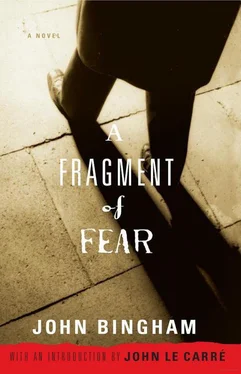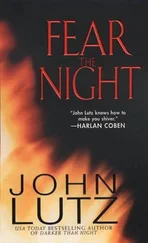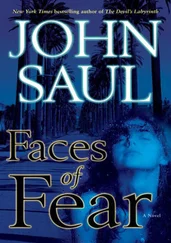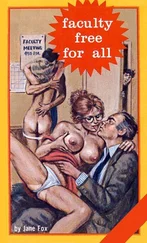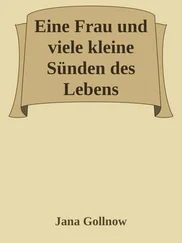John Bingham - A Fragment of Fear
Здесь есть возможность читать онлайн «John Bingham - A Fragment of Fear» весь текст электронной книги совершенно бесплатно (целиком полную версию без сокращений). В некоторых случаях можно слушать аудио, скачать через торрент в формате fb2 и присутствует краткое содержание. Жанр: Триллер, на английском языке. Описание произведения, (предисловие) а так же отзывы посетителей доступны на портале библиотеки ЛибКат.
- Название:A Fragment of Fear
- Автор:
- Жанр:
- Год:неизвестен
- ISBN:нет данных
- Рейтинг книги:3 / 5. Голосов: 1
-
Избранное:Добавить в избранное
- Отзывы:
-
Ваша оценка:
- 60
- 1
- 2
- 3
- 4
- 5
A Fragment of Fear: краткое содержание, описание и аннотация
Предлагаем к чтению аннотацию, описание, краткое содержание или предисловие (зависит от того, что написал сам автор книги «A Fragment of Fear»). Если вы не нашли необходимую информацию о книге — напишите в комментариях, мы постараемся отыскать её.
A Fragment of Fear — читать онлайн бесплатно полную книгу (весь текст) целиком
Ниже представлен текст книги, разбитый по страницам. Система сохранения места последней прочитанной страницы, позволяет с удобством читать онлайн бесплатно книгу «A Fragment of Fear», без необходимости каждый раз заново искать на чём Вы остановились. Поставьте закладку, и сможете в любой момент перейти на страницу, на которой закончили чтение.
Интервал:
Закладка:
I was eager now to be out of the room with its half-light and depression, even a little impatient with myself for entering, and I made for the door.
As I did so, I passed a small table by the windows. On it lay a camera, a tin of English biscuits, her passport, a cheque-book, one of those imitation leather covers which hold travellers’ cheques and a most sumptuously produced book on Pompeii and Herculaneum.
I could not resist picking up the book. It was beautifully illustrated, the photographs taken by a camera artist. At the back of the book, before the pages of the index and bibliography, was a slim Italian bookmark in tooled leather. It had been inserted at the map page showing the lay-out of each street and house in Pompeii. Almost automatically I looked for House No. 27 in Section 2. I found it fairly easily, for the simple reason that somebody, presumably Mrs. Dawson, had marked the site with a small cross in pencil. She had done more. She had traced the route, lightly in pencil, from the Porta Marina, past the Forum, to Section 12 and right up to the house.
She knew where she was going all right.
She had carefully marked the way to her own death. Almost certainly, then, she knew whom she was to meet, which would have made things easier for whoever adjusted her scarf; if you could call it adjusting her scarf.
I am amazed now at the importance I attached to these piffling details at the time and how clever I thought I was.
The evening before I left for London I went to the reception desk and asked for my bill. Alfredo, an olive-skinned Sicilian, was on duty, a pleasant, affable young man of good family, I should say, who was gaining experience in the hotel business by working in various departments. All Italian hotel bills, presented in lire, look like calculated distances in light-years to some distant star. I joked with him about State tax and local tax and service charge, and added a facetious remark, in rather poor taste, which I instantly regretted:
“I hope for Signor Bardoni’s sake that poor Mrs. Dawson had paid her bill.”
“I could not say,” said Alfredo. “Mrs. Dawson always paid her money direct to Signor Bardoni. It was an eccentricity. Perhaps she did not quite trust our mathematics,” he added a little tartly.
“Elderly English ladies sometimes develop these odd habits,” I said soothingly.
I glanced down at the bill with its astronomic-looking total. The details meant nothing to me, and never do, especially those on the little chits attached to the bill, written in indecipherable hieroglyphics, and dealing with items such as wines, bar drinks, soda water, laundry, car hire, room service, etc., most of them long past and uncheckable.
I looked through the chits in a dazed kind of way, but I was not thinking about them. I was finally facing the fact that I wanted to build up Mrs. Dawson as a person. I wanted to know more about her.
She had become my pet victim. The one who was killed but not robbed, either of her jewellery, her money, or her virtue.
“Can you give me her address in England?” I said, suddenly.
Alfredo’s mind was on other things.
“Whose address, sir?”
“Mrs. Dawson’s.”
Signor Bardoni had a light tread. I did not know he was behind me. He said:
“I can give you her address, Mr. Compton, if you come into my office.”
I followed him into his little office, with its tiled floor, modern desk and chairs and filing cabinets.
“Sit down, Mr. Compton.”
I sat down and offered him a cigarette, but he refused it. He did not need to refer to any papers. He knew her address. He said: “In England she lived at the Bower Hotel, Burlington-on-Sea, Sussex. If you had asked me that I would have told you. It was not necessary to go into her room to try to find out, Mr. Compton.”
His chair behind the big desk was higher than mine, which can be annoying if one knows one is in the wrong. He lit a cigar, pulling at it vigorously. Through the blue smoke I saw his eyes watching my face from their wooden sockets.
For the first time in this affair I caught a whiff of hostility. It was something more than that of a hotel proprietor gently reproving a guest for a misdemeanour. I am very sensitive, not merely to atmosphere, but to shades of atmosphere.
“I was not looking for her address, Mr. Bardoni. I was-”
He cut me short.
“It could have been very embarrassing for me-and for you, if the police had heard about it.”
“I happened to be passing her room, and saw the door ajar.”
“Many guests leave their doors ajar, Mr. Compton. It is not usually regarded as an invitation to look round their rooms.”
The rebuke was open and undisguised.
“This guest is permanently away from her room,” I said coldly.
“Mr. Compton, her possessions are still in my care. I am responsible for them.”
I got up out of my chair.
“I am not suggesting anything, Mr. Compton, naturally not, except perhaps to point out that to meddle in matters in which the police of this country are already engaged, either now or even in the future, can perhaps lead to trouble, and even pain for innocent people.”
He was on his feet, too, now, and moving to the door to open it for me. He said:
“Real life people are real life people, and story-book people are story-book people. Better and easier to keep the two apart, is it not?”
His voice suddenly dropped, and he spoke softly and persuasively, and none can do this better than the Italians:
“Better to allow this poor English lady to rest at peace. Her life has run its course, Mr. Compton, with all its trials and tribulations. Her soul has departed, and her body sleeps in our Italian soil which she loved so dearly. Do not create from her sad ghost some distorted character for a book. Agreed?”
He was hammering it up, of course, though to some effect. I hesitated. But he couldn’t leave well alone. As he opened the door he added:
“Let her be, Mr. Compton, let her be! If not for her sake then for your own, for sometimes the dead can hit back!”
It was the cheap threat in those corny words about the dead hitting back which destroyed the earlier effect of his words. As I went out, I said:
“While she was alive her affairs were her own. But now the manner of her death has made her, in some measure, the concern and even the property of us all.”
As a rejoinder it was pretty corny, too, though at the moment, as an off-the-cuff retort, it seemed a nicely rounded phrase.
But like Bardoni, I could not leave well alone. The temptation was too much and I had to have another crack at him.
“I took some flowers to the grave yesterday. The wreath from the hotel staff and guests must have faded, and been removed, since it was not there.”
He stood by the door, soft persuasiveness gone, his entire face now looking as though it had been carved out of wood, not just his eye sockets.
“None of our flowers left on the grave?” he said. “How sad. How unfortunate the sun has been so hot.”
“There was one wreath, from England, from some people called the Stepping Stones,” I murmured indifferently. “And now I will go and pay your bill.”
He bowed. I bade him good night. He did not respond. I did not care. I didn’t like him enough to care. In fact, I cordially disliked him for the way he had reproved me about the room. In fact, for two pins I would have had a damned good row with him.
If I had been listening acutely, I might now have heard the first faint rustle in the undergrowth, even caught the first glint of green eyes. But I wasn’t. I ascribed his attempt to dissuade me from taking an interest in Lucy Dawson to some vague idea of circumventing bad publicity for his hotel. I was, if anything, more determined than ever to find out further details about the woman, and even to write an article or two as soon as possible, mentioning his hotel in a disparaging though non libellous way.
Читать дальшеИнтервал:
Закладка:
Похожие книги на «A Fragment of Fear»
Представляем Вашему вниманию похожие книги на «A Fragment of Fear» списком для выбора. Мы отобрали схожую по названию и смыслу литературу в надежде предоставить читателям больше вариантов отыскать новые, интересные, ещё непрочитанные произведения.
Обсуждение, отзывы о книге «A Fragment of Fear» и просто собственные мнения читателей. Оставьте ваши комментарии, напишите, что Вы думаете о произведении, его смысле или главных героях. Укажите что конкретно понравилось, а что нет, и почему Вы так считаете.
